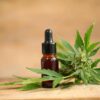
In recent years, the perception of cannabis has undergone a significant transformation, evolving from a controversial substance to a potential therapeutic ally for various medical conditions. Among the myriad of potential benefits, an area that has garnered considerable attention is the use of cannabis in treating chronic inflammation. This shift has sparked interest among patients, cannabis enthusiasts, and medical professionals alike. However, as we venture into this promising yet complex field, it’s critical to approach the subject with both hope and caution, guided by scientific evidence and mindful of the legal landscape.
Understanding Chronic Inflammation
To grasp why cannabis might be beneficial, we first need to understand what chronic inflammation is and how it affects the body. Unlike acute inflammation, which is the body’s short-term response to injury or infection, chronic inflammation is a long-term physiological response that can inadvertently cause damage to the body’s tissues. It has been linked to a range of diseases, including arthritis, heart disease, diabetes, and cancer. Conventional treatments often involve non-steroidal anti-inflammatory drugs (NSAIDs), corticosteroids, and immunosuppressants, each with potential side effects and varying degrees of effectiveness.
Cannabis and its Anti-inflammatory Properties
Cannabis contains numerous compounds called cannabinoids, with THC (tetrahydrocannabinol) and CBD (cannabidiol) being the most well-known. These cannabinoids interact with the body’s endocannabinoid system (ECS), which plays a key role in regulating inflammation. Research has shown that certain cannabinoids possess anti-inflammatory properties. For instance, CBD has been found to reduce inflammation through several mechanisms, including the inhibition of cell proliferation, induction of apoptosis in activated immune cells, and suppression of cytokine production.
Scientific Evidence and Personal Success Stories
A growing body of scientific research supports the anti-inflammatory effects of cannabis. Studies have demonstrated that cannabinoids can modulate the inflammatory process and potentially offer a more natural alternative to traditional anti-inflammatory medications.
Anecdotal evidence and personal success stories further bolster the case for cannabis as a treatment option for chronic inflammation. Many patients report significant relief from symptoms associated with inflammatory conditions when using prescribed medical cannabis, highlighting its potential as part of a comprehensive treatment plan.
Legal Considerations and Disclaimers
It’s important to recognize the legal landscape surrounding the use of cannabis for medical purposes. Laws vary widely by jurisdiction, with some areas permitting the use of medical cannabis under certain conditions while it remains illegal in others. Patients interested in exploring cannabis as a treatment option should consult with a healthcare professional and familiarize themselves with local regulations.
Additionally, while cannabis offers promise as a treatment for chronic inflammation, it is not a cure-all and may not be effective for everyone. Patients should approach treatment under the guidance of a medical professional, considering all potential risks, benefits, and legal implications.
Moving Forward
The use of cannabis in treating chronic inflammation represents a fascinating confluence of ancient wisdom and modern science. As research continues to unfold, it’s crucial for patients, enthusiasts, and professionals to stay informed about the latest scientific findings and legal developments. By approaching cannabis with an open mind and a critical eye, we can better understand its place within the broader spectrum of medical treatments for chronic inflammation and beyond.
Remember, the decision to use medical cannabis should always be made in consultation with a healthcare provider, taking into account individual health circumstances and the legal status of cannabis in your area.
Disclaimer: This blog post is for informational purposes only and does not constitute medical advice. The information contained herein is not intended to diagnose, treat, or cure any disease. Always consult with a healthcare professional regarding any medical conditions or treatment options.






